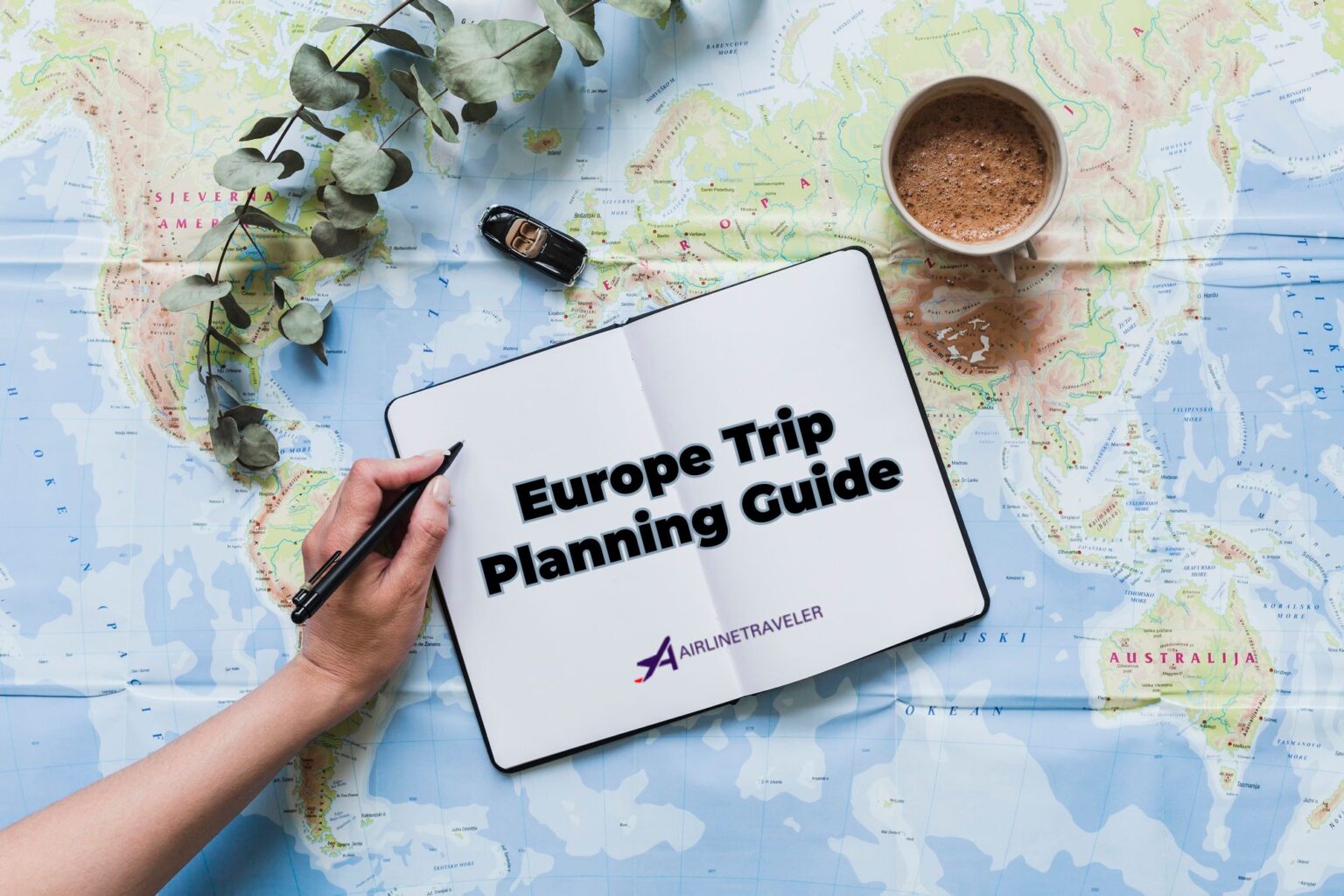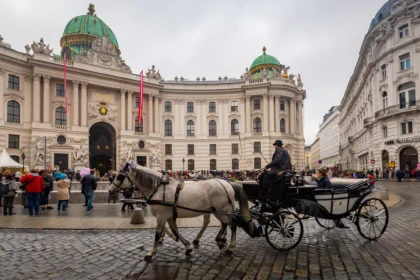Introduction
Embarking on your first trip to Europe is an exciting and memorable experience that can open up a world of culture, history, and adventure. With its diverse countries, languages, and landscapes, Europe offers a wealth of opportunities for exploration and discovery. However, planning such a journey can be overwhelming, especially if you’re unfamiliar with the continent.
In this guide, we’ll walk you through essential things to know when planning your first trip to Europe. From visa requirements and currency considerations to cultural etiquette and packing tips, we aim to equip you with the knowledge and confidence you need to make the most of your European adventure. Whether you’re dreaming of wandering through historic cities, savoring delicious cuisine, or immersing yourself in rich traditions, Europe has something to offer every traveler.
So, let’s get started on this journey of preparation and anticipation. By the time you finish reading this guide, you’ll be better prepared to turn your European travel dreams into reality. Europe awaits, and your adventure begins now!
Visa and Entry Requirements
Before you set foot on European soil, it’s crucial to understand the visa and entry requirements for the countries you plan to visit. Europe consists of a patchwork of nations, each with its own regulations. Here are some key points to keep in mind:
Schengen Area: The Schengen Agreement allows for passport-free travel between 26 European countries. If you’re visiting any of these nations, you’ll typically need a Schengen Visa, which covers your entire journey within the Schengen Area. Research and apply for this visa well in advance of your trip.
Non-Schengen Countries: Some European countries, like the UK and Ireland, are not part of the Schengen Agreement. They have separate visa requirements, so check their entry rules and apply accordingly if you plan to visit them.
Duration of Stay: Ensure you know how long you’re allowed to stay in each country. Overstaying your visa or entry permit can lead to fines, deportation, or future travel restrictions.
Travel Insurance: Many European countries require visitors to have travel insurance that covers medical emergencies. Having comprehensive travel insurance is a good idea, even if it’s not mandatory, as it can provide peace of mind during your trip.
Currency and Money Matters
Understanding the currency and how to manage your finances is crucial for a smooth trip:
Euro (€): The Euro is the official currency in 19 of the 27 European Union countries. Other countries, like the UK, Denmark, and Switzerland, use their own currencies. Be aware of the local currency in each country you visit.
READ ALSO: Payment Methods for Travel: What Is The Best Way To Pay For Things When Traveling Abroad?
Currency Exchange: Familiarize yourself with the current exchange rates and consider exchanging some money before your trip. Additionally, ATMs are widely available for cash withdrawals, and credit/debit cards are widely accepted.
Budgeting: Create a budget for your trip and try to stick to it. Europe can be expensive, so plan for accommodation, food, transportation, and activities accordingly.
Language and Communication
Europe is linguistically diverse, so knowing a few basic phrases in the local language can be immensely helpful. However, English is widely spoken, especially in tourist areas. Here are some tips:
Common Phrases: Learn essential phrases like “hello,” “please,” “thank you,” and “excuse me” in the local language of the countries you’ll be visiting.
Translation Apps: Download translation apps on your smartphone. They can assist you in communicating with locals and deciphering menus and signs.
SIM Cards and Roaming: Consider getting a local SIM card or an international roaming plan for your phone to stay connected and access maps and translation tools.
Culture and Etiquette
Every country in Europe has its unique customs and etiquette. Being mindful of local norms will help you connect with locals and show respect for their culture. Some general tips:
Dress Code: Pay attention to the dress code in religious sites, museums, and restaurants. In some places, modest attire is required.
Tipping: Tipping customs vary from country to country. In some places, service charges are included, while in others, it’s customary to leave a tip. Research tipping guidelines for each destination.
Punctuality: Germans are known for their punctuality, but in southern Europe, schedules may be more flexible. Adapt to the local sense of time.
Greetings: Familiarize yourself with local greetings and gestures to show respect. For instance, a simple handshake may be appropriate in some countries, while others may prefer cheek kisses or a nod of the head
READ ALSO: Exploring Europe: Plan Your Journey with Rail Online’s Eurail Passes
Packing Tips
Packing smartly can make your trip more comfortable and enjoyable:
Weather-appropriate Clothing: Check the weather forecast for each destination and pack accordingly. Layers are usually a good choice for changing weather conditions.
Adapter and Converter: Europe uses different plug types and voltages. Bring a universal adapter and a voltage converter if necessary to charge your electronic devices.
Travel Essentials: Don’t forget essentials like a power bank, a reusable water bottle, and a daypack for exploring.
Important Documents: Keep your passport, visa, travel insurance, and important documents in a secure, easily accessible place.
Accommodation Choices
When it comes to accommodation, Europe offers a wide range of options to suit every budget and travel style:
Hotels: From luxury resorts to budget-friendly options, Europe boasts a vast selection of hotels. Booking in advance is recommended, especially during peak tourist seasons.
Vacation Rentals: Platforms like Airbnb offer a chance to stay in unique properties, including apartments, cottages, and even castles. This can provide a more immersive experience.
Bed and Breakfasts (B&Bs): These cozy and often family-run establishments offer a personalized touch and local insights.
Camping: Europe’s natural beauty can be best experienced by camping in its scenic landscapes. Many countries have well-equipped campsites.
Rural Retreats: For a peaceful escape, consider staying in countryside villas, agriturismos (farm stays), or mountain cabins.
Transportation within Europe
Getting around Europe is relatively easy, thanks to an efficient transportation network:
Trains: Europe boasts an extensive and reliable train system, making it an excellent way to explore different countries. Consider a Eurail Pass if you plan to travel extensively by train.
Buses: Long-distance buses are often more budget-friendly than trains. Companies like FlixBus operate in multiple European countries.
Flights: Low-cost airlines like Ryanair and easyJet offer affordable flights between European cities. Be sure to factor in baggage fees and airport transfers when booking.
Public Transport: Major cities have well-developed public transport systems, including buses, trams, and metros. Invest in city cards or transit passes for convenience and savings.
Car Rentals: Renting a car is a great option if you plan to explore rural areas or small towns. However, consider factors like parking and traffic in city centers.
Cycling: Many European cities are bike-friendly, and you can rent bicycles for urban exploration. In rural areas, cycling can be an excellent way to enjoy the scenery.
Must-See Destinations
Europe offers a wealth of iconic destinations, each with its own charm:
Paris, France: Known as the “City of Love,” Paris is famous for the Eiffel Tower, Louvre Museum, and its romantic ambiance.
Rome, Italy: Explore ancient history at the Colosseum and Roman Forum, and savor delicious Italian cuisine.
Barcelona, Spain: Enjoy the unique architecture of Antoni Gaudí and relax on the beautiful Mediterranean beaches.
Amsterdam, Netherlands: Discover the picturesque canals, historic neighborhoods, and world-class museums.
Prague, Czech Republic: Wander through the fairytale-like streets of this historic city with its stunning architecture.
Athens, Greece: Immerse yourself in the birthplace of Western civilization with visits to the Acropolis and ancient ruins.
Safety and Health
Lastly, your safety and well-being are paramount:
Travel Insurance: Reiterate the importance of travel insurance, which can cover medical emergencies, trip cancellations, and lost belongings.
Health Precautions: Stay informed about any health advisories or vaccination requirements for the countries you plan to visit. Ensure you have any necessary medications.
Emergency Contacts: Carry a list of emergency contacts, including local authorities, your country’s embassy or consulate, and your travel insurance provider.
By considering these additional aspects of your European adventure, you’ll be well-prepared to navigate the continent’s treasures and surprises. Your first trip to Europe promises to be a journey filled with wonder, cultural enrichment, and unforgettable memories.
Europe Trip Planning Guide frequently asked questions
Here are some frequently asked questions (FAQs) to help you further plan your first trip to Europe:
1. Do I need a visa to visit Europe?
It depends on your nationality and the specific countries you plan to visit. Many European countries are part of the Schengen Agreement, which requires a Schengen Visa for travelers from certain countries. Research visa requirements well in advance and apply accordingly.
2. What’s the best time to visit Europe?
Europe is a year-round destination, and the best time to visit depends on your preferences. Summer (June to August) is popular for pleasant weather, while spring and autumn offer milder temperatures and fewer crowds. Winter is ideal for skiing in the Alps and experiencing Christmas markets.
3. How should I handle currency and payments in Europe?
You can use euros in many European countries, but not all. It’s a good idea to have some cash on hand, and credit/debit cards are widely accepted. Notify your bank of your travel plans to avoid any card issues. Currency exchange is available at airports, banks, and exchange offices.
4. Is it necessary to book accommodations in advance?
Booking accommodations in advance is advisable, especially during peak tourist seasons or in popular cities. However, if you prefer flexibility, you can book a few nights and leave the rest open for spontaneity.
5. How do I navigate transportation within Europe?
Europe has an efficient transportation system. Trains, buses, and low-cost airlines can take you between cities. In urban areas, public transport is convenient. Consider purchasing rail passes or city transit cards for savings.
6. Is it safe to travel in Europe?
Europe is generally considered safe for tourists. However, like anywhere else, it’s essential to stay vigilant and take precautions against pickpocketing and other petty crimes. Research the safety situation of specific countries or regions you plan to visit.
7. Should I learn the local language?
While learning some basic phrases in the local language can be helpful and appreciated by locals, English is widely spoken in tourist areas. Download translation apps to assist with communication.
8. How much should I budget for a trip to Europe?
Your budget can vary widely depending on your travel style and the countries you visit. On average, budget travelers may spend around €50-100 per day, while mid-range travelers may spend €100-200 per day. Luxury travel can exceed this range.
9. What are the top must-see attractions in Europe?
Europe is filled with iconic attractions. Some of the must-visit places include the Eiffel Tower in Paris, the Colosseum in Rome, the Acropolis in Athens, the historical streets of Prague, and the beautiful canals of Amsterdam.
10. How can I stay connected while traveling in Europe?
Consider purchasing a local SIM card or an international roaming plan for your phone. Free Wi-Fi is also available in many cafes, hotels, and public places.
These FAQs should provide you with valuable information as you plan your first trip to Europe. Remember to research and prepare thoroughly, but also leave room for spontaneity and adventure during your journey through this diverse and enchanting continent.
Conclusion
In conclusion, planning your first trip to Europe is an exciting endeavor that promises a world of discovery and adventure. By addressing the essential aspects discussed in this guide, such as visa requirements, currency considerations, cultural etiquette, and transportation options, you can set the stage for a smooth and memorable journey.
Remember that Europe is a continent rich in history, culture, and natural beauty, offering a wide range of experiences for travelers of all interests. Whether you’re exploring iconic landmarks, savoring delectable cuisines, or immersing yourself in local traditions, Europe has something to offer everyone.
As you embark on this thrilling adventure, stay curious, open-minded, and adaptable to new experiences. Engage with locals, embrace the diversity of languages and cultures, and be prepared for both planned activities and unexpected discoveries. Your first trip to Europe will undoubtedly leave you with lasting memories and a desire to return to explore even more of this captivating continent.
Now, armed with knowledge and enthusiasm, you’re ready to turn your European travel dreams into reality. Europe beckons, and your journey begins here. Bon voyage, and may your travels be filled with joy, wonder, and unforgettable moments!
In other article, Tips on How to Find Cheapest Airlines for Your Travel







